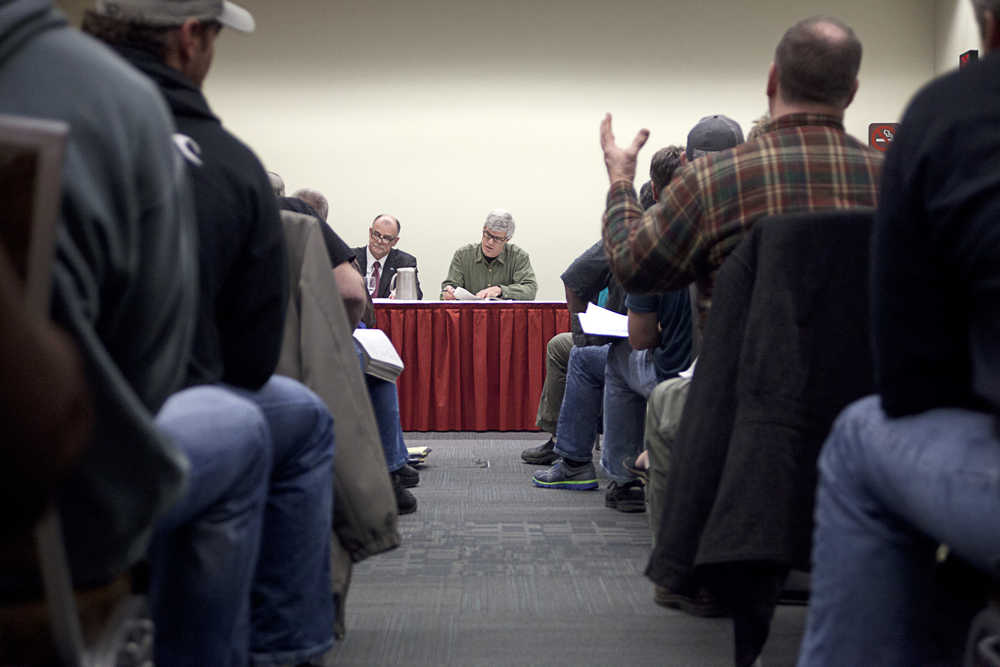The 2017 Upper Cook Inlet meeting of the Alaska Board of Fisheries will be held in Anchorage, as planned and as usual.
The board made the call by a 5-2 vote at the tail end of its Bristol Bay finfish meeting, also in Anchorage. Only two board members, commercial fishermen Sue Jeffrey and Fritz Johnson, voted in favor of a proposal moving the meeting from Anchorage to Kenai Peninsula, where the board hasn’t held an Upper Cook Inlet meeting since the last millennium.
“Maybe next time,” said member John Jensen of Petersburg, drawing an outraged cry from the audience.
“Why maybe?” called John McCombs, a peninsula fisherman and board member of United Cook Inlet Drift Association.
Board director Glenn Haight and others quietly warned McCombs to be quiet while member Sue Jeffrey began making her comments, “hopefully without feeling threatened,” she added.
“Threatening” was the exact term Jensen used to characterize the Upper Cook Inlet meeting issue after the matter had closed.
“I’m glad to have it behind us,” he said.
Member Robert Mumford said he had no compunction against moving the meeting to the peninsula, but ended up voting against the move, not wanting to “upset the apple cart.” Mumford hinted that he felt pressured.
“I feel like we’re in the middle of a soccer game, and at least I’m the ball,” said Mumford.
Walker appointed Mumford to the board in May following the failed appointments of Roland Maw and Robert Ruffner. Mumford has not yet been confirmed by the Legislature.
Board members listed fears of influence peddling, political perceptions, security, convenience and fairness. Jensen said the board goes through pains to make meeting agendas so stakeholders can time their visits to the 14-day meeting. The board’s consensus was that Anchorage, at the center of the Upper Cook Inlet area, is the logical choice.
“If we’re going to be fair to the majority of users, it’s having a meeting in Anchorage,” said Jensen. “The user groups don’t have to spend that much time up here. If they have to come for one part of the meeting, they know where it is.”
Peninsula residents have long argued that the board process is too complex and nuanced to go for only one day, and that the process is therefore skewed against those who can’t make the trip.
Ed Schmitt, the chairman of the Kenai Area Fishermen’s Coalition’s board, said the vote is a blow to the Kenai Peninsula. Two weeks in Anchorage is prohibitively expensive for those without large financial interest in meeting outcomes, so many people who use the fisheries are not heard, he said.
“The community is centered around the Kenai River,” Schmitt said. “It’s in our back yard. It’s what we use. It’s a very frustrating process for the people who are most affected by it.”
A potential meeting relocation has been in spotlight since November, when two letters supporting a meeting relocation made their way to the board, including one from Gov. Bill Walker.
The board had scheduled the meeting for Anchorage last year, and voiced resentment at being made to consider it again. The Bristol Bay meeting, board members said, suffered from the “distraction” of the Upper Cook Inlet relocation issue.
“All this went on during another region’s meeting,” said board member Orville Huntington. “I don’t think it’s fair to the people of Bristol Bay.”
Walker wrote a letter to the board Oct. 21, asking it to consider changing the location and promising to attend if it were held on the Peninsula.
“There has been much attention given to the controversies surrounding the Cook Inlet fisheries, and I feel we should attempt to improve the communication and exchanges among the many interested parties,” wrote Walker. “Holding a meeting on the Peninsula, possibly Soldotna, may show a willingness to consider points of view from local residents who may not have been able to participate over the past five board cycles.”
After Walker’s letter, public officials flooded the Board of Fisheries with written comments either supporting or condemning a meeting relocation.
Mat-Su Sens. Mike Dunleavy and Bill Stoltze jointly scorned Walker’s “rather forceful letter,” accusing him of “inappropriate” commercial fishing favoritism.
“It appears to (our constituents) that you continue to receive bad advice and provide preferential treatment to one user group, commercial fisheries,” the letter states, “to the potential detriment of tens of thousands of Alaskans that participate in recreational and personal use fisheries.”
A second letter offered the board financial benefits, which some board members later equated with a corrupting bidding process.
In a Nov. 16 letter, Kenai Peninsula Borough and City of Kenai mayors Mike Navarre and Pat Porter, and Soldotna Mayor Pete Sprague offered the board over $60,000 in service savings by volunteering local venues, transportation, and coffee service.
“In my opinion, this is a procurement issue,” said member Reed Morisky, a lodge owner. “We’re on a slippery slope here. I don’t recall a public notice saying that offers would be entertained for free venues and free coffee. The board meeting becomes a low bid situation, I think it pollutes the process.”
Peninsula residents said they are down, but not out, and already looking to the board cycle beyond 2017. Rick Koch, the city manager for the city of Kenai, said he was disappointed in the decision but not intending to give up.
“I’m disappointed, obviously,” he said. “My focus and the focus of others will shift in 2020 to the UCI meeting as well as being able to take advantage of the work session that will be held down here in 2016.”
Peninsula Clarion reporter Elizabeth Earl contributed to this report. DJ Summers can be reached at daniel.summers@alaskajournal.com. Elizabeth Earl can be reached at elizabeth.earl@peninsulaclarion.com.

